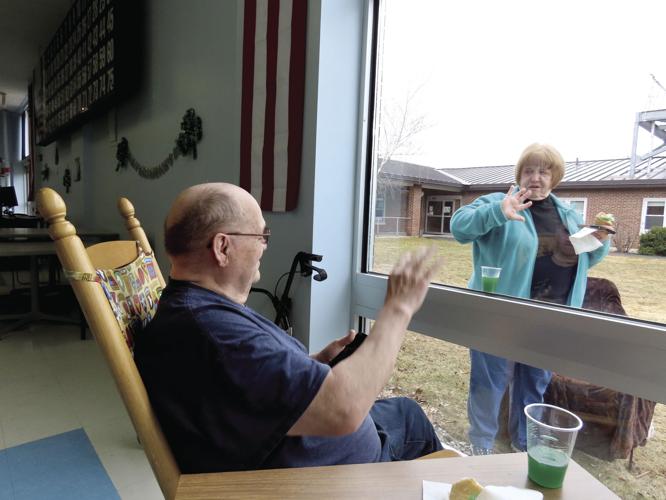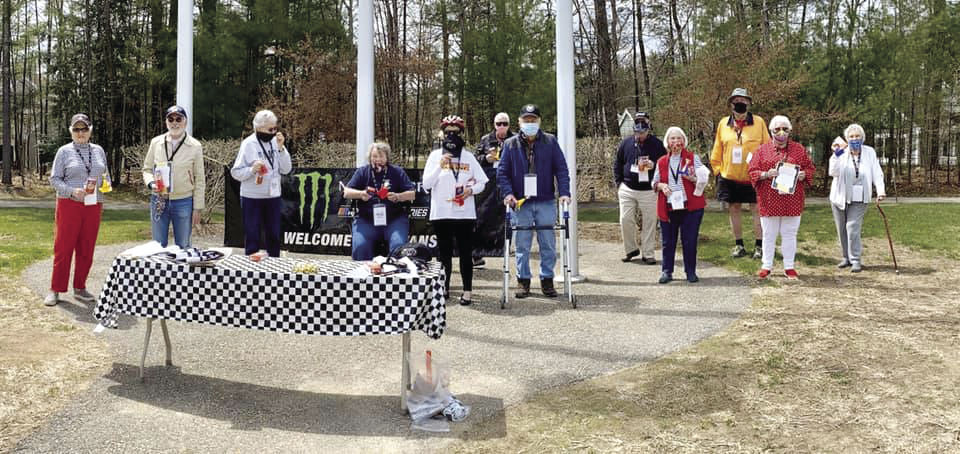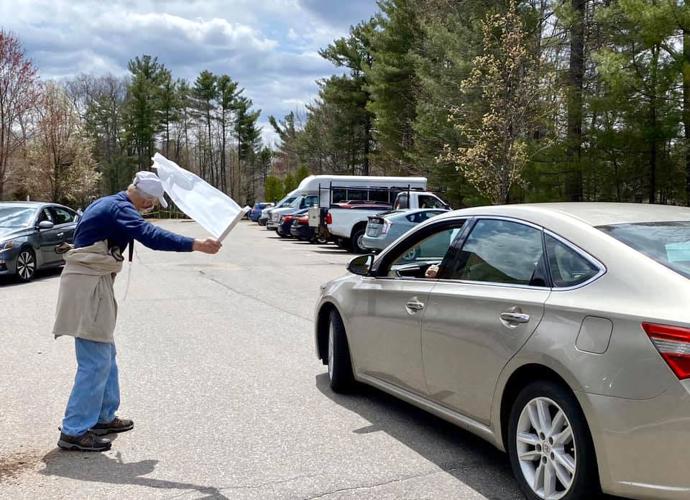TILTON — Like everyone else, Joe Bennett has good and bad days. But April 26 was especially sunny for the centenarian at the New Hampshire Veteran’s Home, who celebrated his 102nd birthday with a party conducted through the nursing home’s Town Meeting Room window.
Four generations of his family members gathered and stood outside with balloons and banners. Inside, the meeting room was decorated with balloons and streamers. Outside, his great granddaughter held her hands up to form a heart. Bennett used an iPad to listen. “We’re so sorry we couldn’t do more,” his daughter said.
Bennett smiled broadly. “This is everything,” he said.
At a time when the coronavirus pandemic has created an interminable drought of social interaction, retirement communities and skilled nursing facilities are trying to counter the climate. It’s an ongoing effort, but one that pays off in brighter days for residents.
Worldwide, from extremes in Italy to the nation’s tragic death toll in New York City, nursing homes remain epicenters of the coronavirus – as researchers worldwide race to find reliable treatments, rapid-results testing, sufficient supplies of protective equipment, and a safe vaccine. During these chaotic and uncharted times, senior residential and long-term care facilities have discovered new ways to preserve one of life’s most valuable assets: social mingling.
“Anywhere you live where family does not live with you can make for a very lonely day,” said Marlene Makowski, regional life enrichment coordinator for NH Catholic Charities. “Social interaction is huge because they still know they’re connected to their family and community. Husbands and wives putting hands against the (window) glass so they still feel like they’re touching one another. When you see a smile and see people talk, you can see how that person’s feeling. If the person on the other side is smiling, they’re happy, too. This way they feel they’re not forgotten.”
Providing satisfying, authentic-feeling social opportunities has been a challenge, according to administrators tasked with keeping fragile elders safe. At nursing homes nationwide, social distancing to slow contagion has prevented outside visitors from coming in, including spouses and close family members. Since mid-March, the Taylor Community, a continuing care retirement community with neighborhoods for independent living as well as rooms for skilled nursing care, has been closed to outsiders entering and residents leaving, effectively quarantining the residents in place.
Nursing homes are likely to remain closed to family members and other outsiders through the summer, experts say. “Until we have a treatment and a vaccine, I fear this is going to continue,” said Brendan Williams, chief executive of the New Hampshire HealthCare Association, which represents 60 nursing homes statewide, including those run by NH Catholic Charities and Genesis HealthCare. Essential is rapid-results testing for everyone on staff, Williams said. New York, with the nation’s highest count of nursing home deaths, is now testing each nursing home worker twice a week.
The goal for senior living and nursing homes remains to limit potential exposure. Direct care workers who are asymptomatic and haven’t been tested for the coronavirus present an ongoing risk. Many facilities still don’t have enough personal protective equipment for staff, including isolation gowns which curtail the spread. Allowing outsiders now, as businesses begin to reopen, or in the near future, could open more opportunities for contagion, Williams said.
In the meantime, residents depend on regular one-on-one and some form of group interaction. Fifty nine percent of long-term care residents have dementia, and understanding or communicating via technology can be overwhelming and confusing at best.
Single-story facilities have welcomed family visits through resident room windows; multi-story facilities wheel residents to picture windows in otherwise empty group space. “It’s something, but it’s not the same as a warm embrace,” Williams said. “It’s the importance of human touch. To hug and be hugged. We are hard-wired to have that be part of our lives.” He worries about the coronavirus’ ongoing effect on senior mental health.
The toll on isolated elders in nursing facilities can be monumental – especially while routine group activities, communal dining and in-person family visits that have occurred like clockwork until now have abruptly stopped. Residents are being fed in their rooms and interacting primarily with the nursing assistants who care for them – which has strengthened those bonds, while ties with others can languish.
To counteract that, senior living communities and nursing homes are experimenting and expanding ways to stay in touch – and in doing so, are learning that visiting doesn’t have to involve physical contact or close proximity. Social media and teleconferencing platforms such as Zoom, Skype, Face Time and Google Hangouts, which can be intimidating and feel stilted at first for people over 70, have been generally well-received, and have opened doors for visiting with families nearby and in distant places. Senior recreation experts have come up with novel ways for elders to play and hold socially-distanced gatherings.
“We’re making the best of a not-great situation,” said Brenda Twardosky, recreation director at the Belknap County Nursing Home in Laconia, where residents play bingo in their rooms by loudspeaker, sit in their doorways and converse with others sitting across the hall. They gather in small, socially distanced groups to work on art projects, gluing and painting while six feet apart in the day room.
So far, the county nursing home, with roughly 86 residents, has experienced no coronavirus cases or deaths.
“We keep spirits up by walking in sunshine. I think there’s a lot of positivity,” Twardosky said. “Do they like it? No. But they keep saying, we’re healthy and we have nothing here.” Window visits aren’t an identical swap for meeting in person. “You can’t hug or kiss, but we’re staying healthy inside.”
Face Time, Google Duo and Skype have become routine ways to visit, laugh and reminisce. Recently, a resident celebrated her 90th birthday with five family members over Zoom.
“She was thrilled,” Twardosky said. After the coronavirus ebbs, “We’re going to continue using technology for out-of-state visits. The residents are getting so much more comfortable with it.”
At the Taylor Community, independent residents participate in socially-distanced raised-bed flower and vegetable gardening, and meet at neighborhood fire pits on benches six feet apart. They talk across the pavement while out on daily walks.
“We know the dogs’ names. We don’t necessarily know the people’s names,” said Carol Ford, 81, who moved here recently from Maryland with her husband. “It’s not as horrible as it could be. You meet people and chit-chat.” The couple also attends church services and Sunday school by Zoom.
“I walk every day, two or three times a day,” said Shirley Crondike, 84, who is originally from North Carolina. “On days like today when it’s so beautiful, people are out. There are benches all over the place. You sit down and talk and keep your six-foot distance. We have gathered in people’s yards, eight of us for cocktails. Everyone brings a little snack and a drink and we sit on lawn chairs, six feet apart.”
Crondike signs up for half-hour stints in Taylor’s exercise room – even though it’s a solo activity during the pandemic. “I’m a people person,” she said. “The days go by and you get into the rhythm of this void.”
Lorraine Doyan, 94, who has lived at Taylor for 13 years, walks to the mail room every day wearing a mask. “We talk to each other as we pass in the halls. They have hand sanitizer all over the place. I see my neighbor. We knock on the door and say ‘Hello, how are you today?’”
Four years ago Doyan celebrated turning 90 by riding the zipline at Gunstock Resort, where she spent a full day with other daredevils and outdoor enthusiasts. Last week she participated in the community-wide Charge Your Battery Grand Prix, in which about 13 drivers circled within the Taylor campus and completed a course of traffic cones in their cars, which had essentially been dormant for winter. Participants received trophies and snacks at pit stops – and a fun topic for shared conversation.
Taylor’s Front Porch Project encourages residents to gather outside, socially distanced. The campus opened for a family car parade on Mother’s Day, with residents cheering from windows and drivers honking horns.
“Depression can set in so easily. It’s important for them to interact with one another,” said Brenda Kean, Taylor’s residential life director. “The more you’re involved with people, it’s a support system. Friendships are helping them get through this, especially when they’re not in touch with their family.”
At the New Hampshire Veterans Home, residents age 60 to 102 are pen pals with students at Red Oak Montessori School in Franklin, who are in nursery school through fifth grade – now that visits can’t occur face to face. Regular recreation programs have been reformatted for social distancing.
Particularly popular is a video simulation of airplane flying, designed by IN2L (It’s Never Too Late), a manufacturer of electronic mind games, puzzles, and art projects. Veterans, especially those who have flight experience, choose which aircraft to fly, where on the globe to fly over, and operate the plane by joystick, switching between views from the cockpit and outside the plane. Three or four other socially-distanced veterans comment and help make decisions.
“They’re really engaged in the program, said Sarah Stanley, programs information officer at the Veterans Home. “They end up talking about what’s going on. It’s a social activity even though it doesn’t appear to be.”
She said veterans have shown similar enthusiasm for league bowling and race car driving using Wii, a video sports simulator that became widely popular 15 years ago.
At St. Francis Rehabilitation and Nursing Center, residents play socially-distanced hallway tic-tac-toe and bingo, using the Karaoke machine as a speaker system.
“I’ve heard a lot of comments about how it’s just nice to see each other,” said Makowski at NH Catholic Charities. “Bingo is still the most popular, with many telling me it’s great to have something to look forward to during all of this. It’s a nice bit of normalcy.” Residents like being able to see each other “and know everyone is doing okay.”
•••
The Sunshine Project is underwritten by grants from the Endowment for Health, New Hampshire’s largest health foundation, and the New Hampshire Charitable Foundation. Roberta Baker can be reached by email at Roberta@laconiadailysun.com





















(0) comments
Welcome to the discussion.
Log In
Keep it Clean. Please avoid obscene, vulgar, lewd, racist or sexually-oriented language.
PLEASE TURN OFF YOUR CAPS LOCK.
Don't Threaten. Threats of harming another person will not be tolerated.
Be Truthful. Don't knowingly lie about anyone or anything.
Be Nice. No racism, sexism or any sort of -ism that is degrading to another person.
Be Proactive. Use the 'Report' link on each comment to let us know of abusive posts.
Share with Us. We'd love to hear eyewitness accounts, the history behind an article.